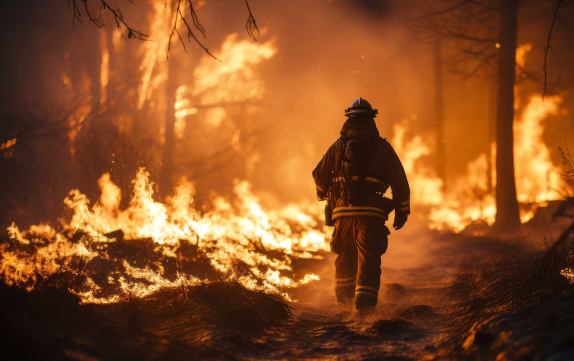
A new study has found a strong link between long-term exposure to fine particulate matter (PM2.5) from wildfires and an increased risk of dementia. The research, published in JAMA Neurology, was conducted by a team led by Joan Casey, a professor at the University of Washington School of Public Health.
The researchers analyzed electronic health records (EHR) of over 1.2 million Californians aged 60 and older. They found that those exposed to higher levels of wildfire-generated PM2.5 over an extended period had a significantly increased risk of developing dementia.
While the detrimental effects of long-term exposure to PM2.5 on cognitive health have been previously established, this study specifically focused on the impact of wildfire-generated PM2.5, which has become increasingly prevalent due to climate change.
The researchers compared the long-term exposure to wildfire-generated PM2.5 and non-wildfire PM2.5 with the risk of dementia diagnosis. They found that a 1 microgram per cubic meter (μg/m³) increase in the 3-year average of wildfire-generated PM2.5 was associated with an 18% increased risk of dementia diagnosis, compared to a 1% increase for non-wildfire PM2.5.
The study also revealed that the association between wildfire PM2.5 exposure and dementia risk was stronger among individuals aged 75 and older, as well as in minority groups and those living in poverty.
The researchers concluded that their findings highlight the need for interventions to reduce wildfire-generated PM2.5 exposure, especially for vulnerable populations. As climate change intensifies and wildfires become more frequent, mitigating exposure to wildfire-generated air pollution could be a crucial strategy to reduce dementia risk and health disparities.
Key findings of the study:
Long-term exposure to wildfire-generated PM2.5 significantly increases the risk of dementia.
The risk is particularly high for older adults, minority groups, and those living in poverty.
Reducing exposure to wildfire-generated PM2.5 can be a valuable strategy for preventing dementia and addressing health disparities.
Implications:
The study underscores the urgent need for policies and strategies to mitigate the effects of climate change and reduce air pollution, particularly in areas prone to wildfires. By understanding the link between wildfire-generated PM2.5 and dementia, researchers and policymakers can work together to develop effective interventions to protect public health.
[Copyright (c) Global Economic Times. All Rights Reserved.]






























